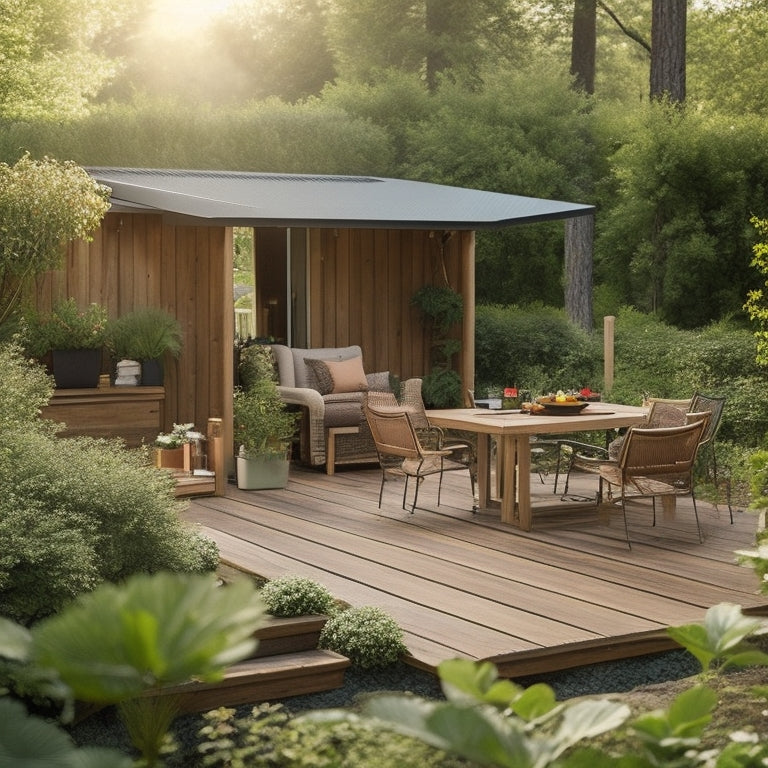
Green Deck Options: Earth-Conscious Choices for Your Home
Share
You're looking for a deck that not only enhances your home's exterior but also aligns with your eco-friendly values. Fortunately, there are various earth-conscious deck options to choose from, each offering unique benefits. Sustainable wood options like Western Red Cedar, Cypress, and Ipe are naturally resistant to rot and insects, while reclaimed wood provides a one-of-a-kind aesthetic and reduces environmental impact. Composite decking alternatives, such as recycled plastic decks, minimize waste and conserve resources. As you investigate these eco-friendly materials, you'll uncover even more ways to create an environmentally responsible outdoor space that reflects your commitment to sustainability.
Key Takeaways
- Focus on natural finishings and sustainable materials with green certifications like FSC or ISO 14021 to minimize environmental impact.
- Consider eco-friendly decking alternatives like recycled plastic, bamboo, and reclaimed wood to reduce waste and conserve resources.
- Prioritize durable and low-maintenance materials that require minimal upkeep, such as recycled plastic decks, to save time and money.
- Explore government-backed incentives for sustainable infrastructure development and incorporate renewable energy design to further minimize carbon footprint.
- Choose materials that align with eco-conscious values and aesthetics, such as natural fibers like hemp and eucalyptus, for a unique and sustainable outdoor space.
Eco-Friendly Decking Materials Guide
When building a deck, you're likely considering the environmental impact of your materials. You want to ascertain that your outdoor space not only looks great but also aligns with your values.
Look for eco-friendly decking materials that boast natural finishings, reducing the need for chemical treatments or toxic sealants. Opt for products with reputable green certifications, such as the Forest Stewardship Council (FSC) or the International Organization for Standardization (ISO) 14021. These certifications guarantee sustainable sourcing and minimal environmental harm.
Additionally, investigate recycled or reclaimed materials, which can considerably reduce waste and conserve natural resources.
Moreover, government-backed incentives, such as Clean Transportation Infrastructure Grants, can also support sustainable infrastructure development.
Sustainable Wood Deck Options
Sustainable Wood Deck Options
Softwoods like Western red cedar and cypress make excellent sustainable wood deck options, thanks to their natural resistance to rot and insects. When choosing a sustainable wood deck, you'll want to look for options that are certified by organizations like the Forest Stewardship Council (FSC). This guarantees that the wood is harvested from forests that are managed in an environmentally responsible and socially beneficial manner.
| Wood Type | Sustainable Features |
|---|---|
| Western Red Cedar | Naturally resistant to rot and insects, FSC certified |
| Cypress | Durable, resistant to decay, and sustainably sourced |
| Ipe | Harvested from well-managed forests, FSC certified |
| Redwood | Sustainably harvested, durable, and resistant to decay |
| Bamboo | Highly renewable, low carbon footprint, and FSC certified |
Remember to prioritize sustainable sourcing and ethical harvesting practices when selecting your wood deck material.
Composite Decking Alternatives
You're likely contemplating composite decking alternatives that are eco-friendly and sustainable.
Two options you'll want to investigate are eco-friendly deck materials and sustainable wood options that minimize environmental impact.
Additionally, you may want to think about integrating solar-powered charging solutions solar integration for your outdoor space, which can reduce your reliance on fossil fuels and minimize environmental impact.
These alternatives can provide a greener deck solution that aligns with your values and supports a healthier planet.
Eco-Friendly Deck Materials
As homeowners opt for environmentally conscious outdoor spaces, they're turning to eco-friendly deck materials that not only reduce their carbon footprint but also provide a durable and low-maintenance alternative to traditional wood decks.
You're likely looking for materials that are both sustainable and aesthetically pleasing. Consider bamboo, a highly renewable resource with natural finishes that blend seamlessly with outdoor environments.
With the increasing adoption of solar power in electrification sustainable electrification, it's crucial to choose deck materials that complement this eco-friendly approach.
Recycled plastic lumber is another option, made from post-consumer waste and offering a low-maintenance, eco-friendly solution.
When choosing eco-friendly deck materials, look for products made from recycled materials, sustainably sourced wood, and environmentally responsible manufacturing processes.
Sustainable Wood Options
Bamboo and recycled plastic lumber are great options for eco-friendly decks, but what if you're looking for a more traditional wood deck feel without the environmental guilt?
You can opt for certified wood from sustainably managed forests, ensuring wood sustainability and forest certification. Consider reclaimed timber or locally sourced wood to reduce waste and carbon footprint.
By evaluating fleet energy needs and consumption energy audit, you can identify areas for improvement and reduce reliance on fossil fuels.
Tropical hardwoods like ipe or teak are durable, but choose alternatives like certified eucalyptus or cypress for a more eco-friendly option.
Finish your deck with natural oils or waxes to maintain its wood durability.
Reclaimed Wood Deck Benefits
Rustic barns, vintage factories, and century-old trees have given up their wooden planks to become the building blocks of your new deck.
You're not only getting a unique, one-of-a-kind look, but you're also reducing the environmental impact of your deck. By incorporating renewable energy integration into your deck's design, you can further minimize your carbon footprint.
Reclaimed wood aesthetics add a touch of history and character to your outdoor space, making it truly special. By choosing reclaimed wood, you're redirecting materials from landfills and reducing the demand for newly harvested lumber.
This eco-friendly option reduces the carbon footprint of your deck, giving you peace of mind and a clear conscience. With reclaimed wood, you're making a statement about your values and commitment to the environment.
Low-Maintenance Deck Solutions
Investigate low-maintenance deck solutions that fit your lifestyle and budget.
You'll appreciate the freedom from constant upkeep, allowing you to enjoy your outdoor space without worrying about tedious maintenance tasks.
Look for maintenance-free innovations, such as composite decking made from recycled materials, which resist rot, mold, and insect damage.
Weather-resistant finishes, like powder coatings or acrylic sealants, provide an extra layer of protection against harsh elements.
These solutions not only reduce your environmental footprint but also save you time and money in the long run.
Bamboo Decking Advantages
As you investigate low-maintenance deck solutions, you may find that natural materials can offer a unique blend of sustainability and performance.
Bamboo decking, in particular, has gained popularity for its eco-friendly benefits and stylish appeal.
Here are some advantages of choosing bamboo decking:
-
High bamboo sustainability: Bamboo is a highly renewable resource, with some species growing up to 3 feet per day. This rapid growth rate allows for a considerably reduced carbon footprint compared to traditional wood decking.
-
Low maintenance: Bamboo decking is naturally resistant to pests and decay, reducing the need for chemical treatments and regular maintenance.
-
Unique bamboo aesthetics: Bamboo's natural grain pattern and warm tones add a distinct touch to your outdoor space, setting it apart from traditional deck materials.
- Durability: Bamboo decking can last up to 20 years or more with proper installation and care, making it a long-lasting choice for your home.
Recycled Plastic Deck Options
You're considering eco-friendly material options for your deck, and recycled plastic is a great choice.
These decks require low maintenance, as they're resistant to rot, mold, and insect damage.
Plus, they're durable deck solutions that can withstand harsh weather conditions, making them a practical and environmentally responsible option.
Eco-Friendly Material Options
When building a green deck, recycled plastic deck options offer an engaging eco-friendly material solution. You can choose from a variety of eco-friendly materials that not only reduce waste but also provide durability and low maintenance.
-
Natural fiber options like bamboo, hemp, and eucalyptus offer a sustainable alternative to traditional wood decks.
-
These fibers are resistant to pests and decay, making them a great choice for outdoor use.
-
Environmentally safe finishes can be applied to protect the deck from the elements while maintaining its natural beauty.
- Recycled plastic decking made from post-consumer waste like plastic bottles and bags reduces landfill waste and conserves natural resources.
Low Maintenance Requirements
One of the most significant advantages of recycled plastic deck options is that they come with minimal upkeep requirements, freeing you from the hassle of frequent maintenance and repairs.
This means you'll spend less time and money on upkeep, and more time enjoying your outdoor space. With easy care and time-saving benefits, recycled plastic decks are an attractive option for homeowners who value freedom from maintenance.
You won't need to worry about regular staining, sealing, or replacement, as these decks are designed to withstand the elements. Plus, they're resistant to rot, mold, and insect damage, further reducing the need for repairs.
This low-maintenance approach allows you to focus on what matters most – relaxation and enjoyment of your outdoor space.
Durable Deck Solutions
They're built to last - recycled plastic deck options boast exceptional durability, ensuring your outdoor space remains safe and beautiful for years to come.
You can enjoy long-lasting performance without worrying about frequent replacements or costly maintenance.
Here are some benefits of recycled plastic deck options:
-
Weather resistance: Withstands harsh weather conditions, including extreme temperatures, rain, and sunlight.
-
Low risk of rot and decay: Made from recycled plastic, these decks are impervious to moisture, reducing the risk of rot and decay.
-
High impact resistance: Can withstand heavy foot traffic and accidental drops without suffering damage.
- Minimal fading and discoloration: Retains its original color and appearance for a longer period, ensuring your deck remains visually appealing.
Frequently Asked Questions
Can I Install a Green Deck Myself or Do I Need a Professional?
You're a DIY expert, but installing a green deck solo can be a recipe for disaster; unless you're confident in your skills, it's wise to seek professional assistance to guarantee a sturdy, eco-friendly oasis that lasts.
How Do I Maintain a Deck to Ensure Its Longevity?
You'll guarantee your deck's longevity by following deck cleaning tips, like regular power washing and staining, and performing seasonal maintenance, such as inspecting for damage and securing loose boards, to keep your outdoor space safe and beautiful.
Are There Any Local Building Codes for Eco-Friendly Decks?
You'll be surprised to know that over 90% of homeowners don't research local building codes before starting a deck project. When building an eco-friendly deck, you'll need to familiarize yourself with local regulations regarding sustainable materials, ensuring your project meets environmental standards and avoids costly revisions.
Can I Mix and Match Different Green Deck Materials?
You can definitely mix and match different sustainable materials to achieve your desired design aesthetics, but be certain to take into account factors like durability, maintenance, and cost when combining materials to guarantee a cohesive and functional deck.
What Is the Average Cost of a Green Deck Compared to Traditional Decks?
You'll find that the average cost of a green deck, made with sustainable materials, can range from 10% to 50% more than traditional decks, depending on the materials and design you choose, making it essential to weigh the cost comparison carefully.
Related Posts
-

7 Best Home Hydrogen Fuel Cells for Clean Power
You're considering adopting hydrogen fuel cells for clean power at home, but you want to know the best options. Reput...
-

Smart Energy: Greener Homes With Connected Power Devices
You can control and optimize your energy consumption with smart energy devices, reducing your carbon footprint by up ...
-

Why Vertical Gardens Reduce Home Energy Consumption
By incorporating a vertical garden into your home design, you'll reduce energy consumption through natural insulation...


